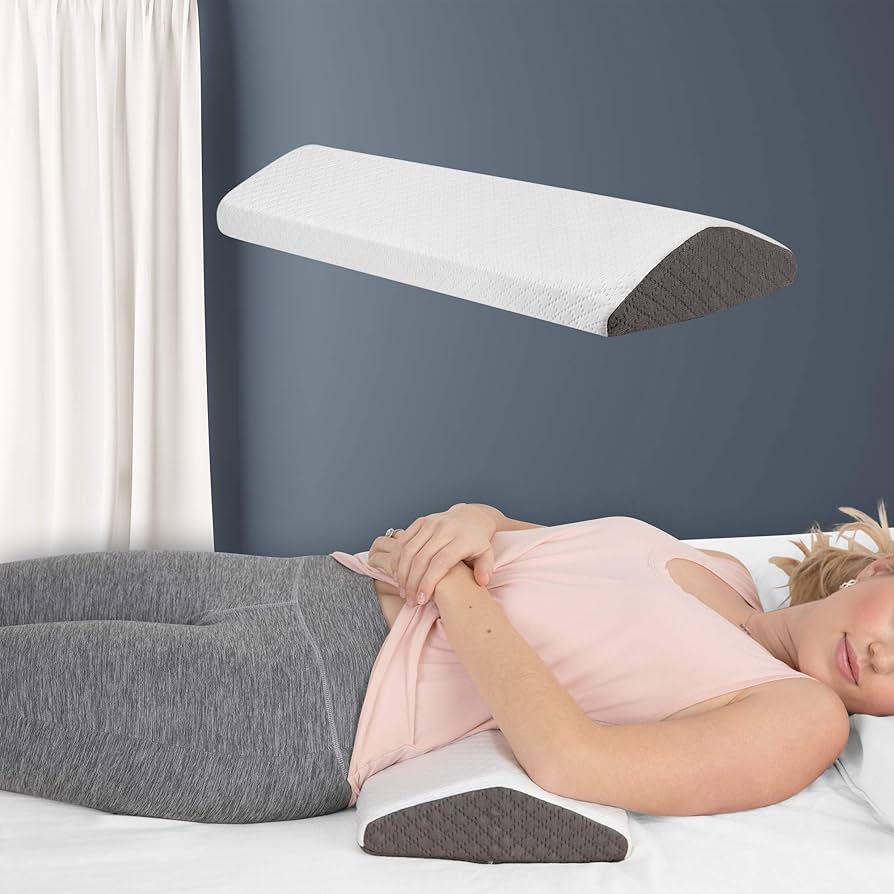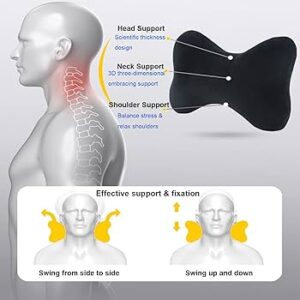

Bad neck posture is a common complaint these days, with so many of us working long hours at desks, glued to our smartphones, or slouching on the couch.
You might think, “How could a pillow possibly fix that?”
Well, as it turns out, the pillow you rest your head on at night could be the hero your neck has been waiting for!
This article dives into how proper pillow support can improve your neck posture, reduce pain, and even prevent long-term damage.
We will cover why posture matters, the features of a good pillow, and what to look for based on your sleeping position.
Article Index:
- Why Your Neck Posture Matters
- The Role of Pillows in Neck Posture
- What Features to Look for in a Pillow
- Real-Life Examples of Pillow Support Making a Difference
- Scientific Backing: What Research Says
- Matching Pillows to Sleeping Positions: A Detailed Breakdown
- FAQs on Pillow Support for Fixing Computer Neck
- Conclusion: How to Pick the Perfect Pillow for You
Why Your Neck Posture Matters?
Let us start with why neck posture is such a big deal.
Think of your neck as the highway that connects your brain to your body. It supports your head (which, by the way, weighs as much as a bowling ball), and improper alignment can cause serious wear and tear.
Poor neck posture can lead to chronic pain, stiffness, tension headaches, and even long-term conditions like cervical spondylosis.
Real-world example: You know that friend who always complains about their “tech neck” from staring down at their phone all day?
Poor neck posture does not just look uncomfortable; it can lead to years of muscle tension and even permanent damage to the cervical spine.
According to a study by the National Institutes of Health (NIH), chronic neck pain often stems from bad posture, with the average head forward tilt adding as much as 60 pounds of pressure on your spine.
This highlights why maintaining proper neck alignment is essential.
The Role of Pillows in Neck Posture
At this point, you might be wondering: how exactly does a pillow help with neck posture?
It is simple: the right pillow aligns your neck with the rest of your spine while you sleep, keeping it in a neutral position.
If your pillow is too high or too low, your neck is forced into awkward angles, leading to muscle strain and even worsening your posture during the day.
The correct pillow keeps your neck in line with your spine, whether you are a back, side, or stomach sleeper.
Think of your pillow as a mini neck chiropractor that works while you snooze!
Key features of a supportive pillow include:
- Correct loft (height)
- Firmness that matches your sleep position
- Ergonomic design to cradle the natural curve of your neck
What Features to Look for in a Pillow?
So, what should you look for in a pillow if you want to avail the best forward head posture fix???
It depends on your sleeping style and personal comfort preferences.
But there are a few universal features that make a pillow posture-friendly.
Loft (Height):
The height of the pillow is critical.
If it is too high, it pushes your head forward (or to the side if you are a side sleeper), creating strain on your neck.
If it is too low, your head sags backward, compressing the neck joints.
- For back sleepers: A medium loft pillow is ideal to keep the head from tilting too far forward or back.
- For side sleepers: A higher loft pillow fills the space between your head and shoulder.
- For stomach sleepers: A very thin pillow is best, or even no pillow at all!
The Material:
Memory foam pillows are popular because they mold to the shape of your head and neck, providing consistent support throughout the night.
Latex pillows offer a bouncier, more natural feel, while down pillows tend to be softer and more adjustable.
The Shape:
Ergonomically shaped pillows, like contoured or cervical pillows, are designed specifically to support the neck curve (lumbar support cushion).
These can work wonders for people dealing with neck pain or stiffness.
Real-Life Examples of Pillow Support Making a Difference
Let us take Jane, for instance.
She is a 35-year-old graphic designer who started experiencing neck pain after long hours at her computer.
She tried changing her desk setup, but the pain persisted.
Finally, her doctor recommended an orthopedic pillow.
After just a week of using a contoured memory foam pillow, Jane noticed that not only was her neck pain diminishing, but she was waking up more refreshed and energized.
The pillow kept her neck aligned during sleep, allowing her muscles to relax and heal overnight.
Or take Michael, a construction worker with chronic neck stiffness from years of physically demanding work.
After trying a latex pillow with a high loft suited for side sleepers, he experienced significant relief as the pillow supported his neck and shoulders better than any standard pillow could.
These real-life cases demonstrate that with the right pillow, it is possible to reverse the damage caused by years of poor neck posture.
Scientific Backing: What Research Says
You might be thinking, “Okay, but where is the hard proof?”
Several studies back the idea that the right pillow can improve neck posture and reduce pain.
A 2010 study published in the Journal of Manipulative and Physiological Therapeutics found that ergonomic pillows reduced neck pain in participants, and those who switched to posture-supporting pillows reported better sleep quality as well.
Another study from the National Center for Biotechnology Information (NCBI) showed that individuals who used specially designed cervical pillows experienced less neck pain and stiffness compared to those using standard pillows.
The pillow’s shape helped maintain proper spinal alignment, reducing strain on the neck muscles.
Matching Pillows to Sleeping Positions: A Detailed Breakdown
A quick look at all the possible aspects:
Back Sleepers:
Back sleepers need a pillow that supports the natural curve of their neck while keeping the spine straight.
A medium-loft memory foam pillow is ideal, as it contours to the neck without pushing the head too far forward.
Side Sleepers:
Side sleepers often struggle with finding a pillow that fills the gap between the head and the shoulder.
A firm, high-loft pillow works best here to prevent the neck from sagging and causing misalignment.
Stomach Sleepers:
Stomach sleepers are at the greatest risk for neck strain because the head is often turned to one side for hours.
A thin pillow or no pillow at all is usually recommended to minimize neck rotation and stress.
Combination Sleepers:
For those who switch positions throughout the night, a pillow that is adjustable, like a shredded memory foam pillow, can offer versatility, conforming to different positions as needed.
FAQs on Pillow Support for Fixing Computer Neck
Q1: How does proper pillow support help maintain the natural curvature of the neck during sleep?
A1: A well-designed pillow supports the cervical spine by filling the gap between the neck and the mattress, preserving the neck’s natural lordotic curve. This alignment prevents undue strain on muscles and ligaments, reducing stiffness and promoting healthier posture while resting.
Q2: Can using the right pillow reduce the risk of developing chronic neck pain?
A2: Yes, by keeping the neck aligned with the spine, the correct pillow minimizes stress on cervical discs and soft tissues. This helps prevent muscle fatigue and joint irritation that often lead to chronic neck pain, especially in people who spend extended time sleeping or resting.
Q3: How does pillow height influence neck posture during different sleep positions?
A3: Pillow height should vary with sleeping position: a medium loft supports side sleepers by aligning the head with the spine, while a thinner pillow suits back sleepers by preventing the head from tilting backward. Using a pillow too high or too low can misalign the neck, causing discomfort and posture issues.
Q4: What role does pillow firmness play in supporting neck posture?
A4: Pillow firmness contributes to stable support; a pillow that is too soft may cause the neck to sink, disrupting alignment, while an overly firm pillow can create pressure points. An ideal pillow offers balanced firmness to maintain the neck’s curve without excessive compression.
Q5: How can specialized pillows, like cervical or contour pillows, improve neck posture compared to standard pillows?
A5: Cervical or contour pillows are ergonomically designed with curves that cradle the neck’s natural shape. These pillows provide targeted support, reducing muscle tension and encouraging proper alignment more effectively than traditional flat pillows.
Q6: Can consistent use of appropriate pillow support lead to long-term improvements in daytime neck posture?
A6: Yes, by maintaining correct neck alignment during sleep, pillows help reduce muscle strain and promote better spinal habits. Over time, this can translate into improved posture during waking hours, decreasing the likelihood of neck pain and related musculoskeletal issues.
Takeaway: How to Pick the Perfect Pillow for You?
At the end of the day (or night, in this case), fixing your neck posture does not have to be complicated.
A good pillow can go a long way in providing relief from neck pain, improving your posture, and preventing long-term issues.
By considering factors like your sleeping position, the pillow’s loft, material, and shape, you can find a pillow that works wonders for you.
If you are suffering from neck pain or poor posture, investing in an ergonomic pillow could be the simple, cost-effective solution you have been searching for.
You will be amazed how much better you feel once your neck is properly supported.
After all, if a good night’s sleep can make you feel better emotionally, why should not it help you physically too?
Solution:
Start with identifying your sleep position, then select a pillow designed for it.
Try options like memory foam pillow, latex, or contoured pillows, and give your neck the support it deserves.
You might be surprised at just how transformative the right pillow can be!
Remember, your pillow is not just a fluffy rectangle under your head; it is a tool that, when chosen wisely, can fix bad neck posture and improve your overall health.
So, do not underestimate the power of a well-supported night’s sleep!
References:

